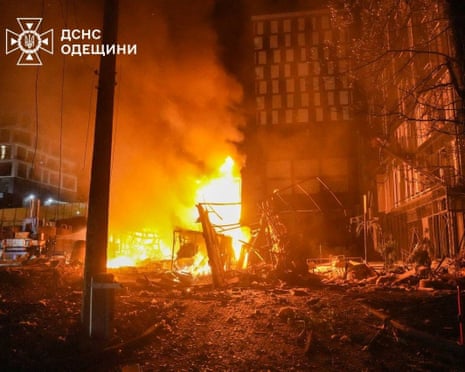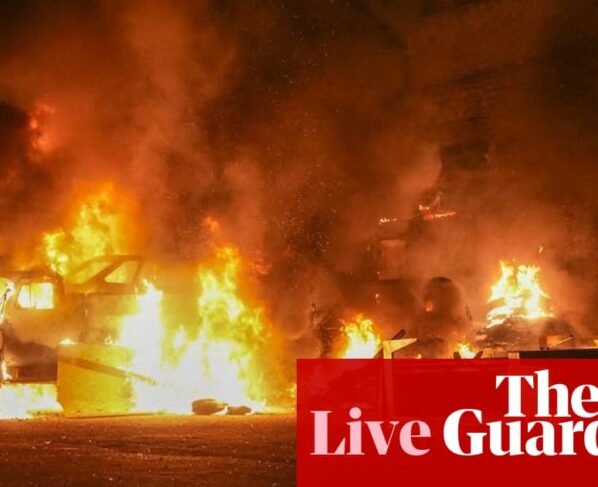Morning opening: What’s next for Ukraine?
Jakub Krupa
At least four people were killed and more than 30 injured in another round of Russian strikes on Ukraine overnight, just days after a series of phone calls between US president Donald Trump, Russian president Vladimir Putin, and Ukrainian president Volodymyr Zelenskyy.

The latest attack will once again pose questions on what’s next for Ukraine as the US ceasefire proposal, pursued by Trump, appears to be failing to make any further progress.
Zelenskyy’s top aide Andriy Yermak said in an update on Telegram that “one of the important principles of defence is the destruction of the enemy’s ability to produce weapons,” as he called for “Russia’s military-industrial complex … to be weakened in various ways: from sanctions to direct strikes.”
The western world must realise that Russia’s scaling up of weapons production only brings us closer to the day when it will be used not only against Ukraine.
Elsewhere, some parts of Europe still battles heatwave with temperatures close to 40 Celsius in Greece, while others in central and eastern Europe are on alert for storms and torrential rains.
In Strasbourg, the European parliament will hold a debate ahead of this Thursday’s vote of no confidence in Ursula von der Leyen’s EU commission.
We are also waiting for more updates from EU-US trade talks, and on the latest situation on the Polish border with Germany after Poland has reintroduced controls overnight in an attempt to prevent irregular migration.I will bring you all the updates from Ukraine and across Europe here.
It’s Monday, 7 July 2025, it’s Jakub Krupa here, and this is Europe Live.
Good morning.
Key events
Zelenskyy discussed replacing Ukraine ambassador to US with Trump, Bloomberg says
Back to Ukraine, Bloomberg News (£) has just reported that Ukrainian president Volodymyr Zelenskyy discussed replacing the current ambassador to the US during his phone call with President Donald Trump on Friday.
Bloomberg reported that Ukraine’s prime minister Denys Shmyhal is high on the list of potential candidates, with some other senior figures such as his deputy Olha Stefanishyna and defence minister Rustem Umerov also believed to be under consideration.
Paris reopens Seine River to public swimming after century-long ban

Kate Connolly
Parisians and tourists flocked to take a dip in the Seine River this weekend after city authorities gave the green light for it to be used for public swimming for the first time in more than a century.
The opening followed a comprehensive clean-up programme sped up by its use as a venue in last year’s Paris Olympics after people who regularly swam in it illegally lobbied for its transformation.
The outgoing mayor of Paris, Anne Hidalgo, also helped to champion the plans, jumping in the river herself before the Olympics.
About 1,000 swimmers a day will be allowed access to three bathing sites on the banks of the Seine for free, until the end of August.
Zakynthos hit by earthquake, with no injuries reported
The Greek island of Zakynthos was hit by a 4.1 magnitude earthquake overnight, Kathimerini reported.
No injuries or significant damage were reported, it added.
The paper noted that “Zakynthos was all but destroyed in a 6.8 magnitude tremor in 1953.”
Fresh scandal hits Spain’s ruling party as official quits over sexual harassment claims
Sam Jones
in Madrid
Pedro Sánchez’s efforts to reset Spain’s ruling socialist party after damaging corruption allegations that threatened to topple his coalition government have suffered a severe setback over the weekend after a party official resigned over accusations of sexual harassment.
The prime minister had hoped this weekend’s meeting of the federal committee of his Spanish Socialist Workers’ party (PSOE) would help the party move past weeks of scandals that have undermined the ethical and anti-corruption pledges on which it came to power seven years ago.
But such hopes were flattened late on Friday night after the online newspaper elDiario published allegations from various female PSOE workers who said they had been subjected to sexual harassment by Francisco Salazar, who oversaw institutional coordination at the Moncloa palace, the office and official residence of the prime minister.
The accusations prompted Salazar to announce on Saturday that he was stepping down from that post and from his new role as a deputy in the PSOE’s organisational secretariat.
He told elDiario he could not recall any inappropriate interactions. “I’ve racked my brains over it and it seems mind-boggling to me,” he said. “I keep wondering if I’ve screwed up and said something inappropriate to a workmate, and the truth is, I can’t find [an example].”
Sources at Moncloa, in Madrid, said an investigation had been launched, but added that no official complaints had so far been made against Salazar.
On Saturday, Sánchez apologised again for what he called his misplaced confidence in those accused of wrongdoing, adding: “I was wrong to place my trust in people who didn’t deserve it, but we won’t fall short in a time of democratic regeneration.”
The prime minister, who is under growing pressure to call a snap election, said he had no intention of stepping down.
Zelenskyy tells partners to ‘fulfill everything we agreed on’ as he seeks more air defence for Ukraine
Ukrainian president Volodymyr Zelenskyy has now responded to the overnight attacks on Ukraine, ramping up pressure on the US and European allies to help with air defence systems.
“We very much expect that our partners will fulfil everything we agreed on. Air defence is the main thing for protecting life,” he said.
Zelenskyy added that Ukraine was developing investments plans to increase its own weapon production, including “all types of drones,” and with “special attention paid to interceptor drones.”
Morning opening: What’s next for Ukraine?

Jakub Krupa
At least four people were killed and more than 30 injured in another round of Russian strikes on Ukraine overnight, just days after a series of phone calls between US president Donald Trump, Russian president Vladimir Putin, and Ukrainian president Volodymyr Zelenskyy.
The latest attack will once again pose questions on what’s next for Ukraine as the US ceasefire proposal, pursued by Trump, appears to be failing to make any further progress.
Zelenskyy’s top aide Andriy Yermak said in an update on Telegram that “one of the important principles of defence is the destruction of the enemy’s ability to produce weapons,” as he called for “Russia’s military-industrial complex … to be weakened in various ways: from sanctions to direct strikes.”
The western world must realise that Russia’s scaling up of weapons production only brings us closer to the day when it will be used not only against Ukraine.
Elsewhere, some parts of Europe still battles heatwave with temperatures close to 40 Celsius in Greece, while others in central and eastern Europe are on alert for storms and torrential rains.
In Strasbourg, the European parliament will hold a debate ahead of this Thursday’s vote of no confidence in Ursula von der Leyen’s EU commission.
We are also waiting for more updates from EU-US trade talks, and on the latest situation on the Polish border with Germany after Poland has reintroduced controls overnight in an attempt to prevent irregular migration.I will bring you all the updates from Ukraine and across Europe here.
It’s Monday, 7 July 2025, it’s Jakub Krupa here, and this is Europe Live.
Good morning.





